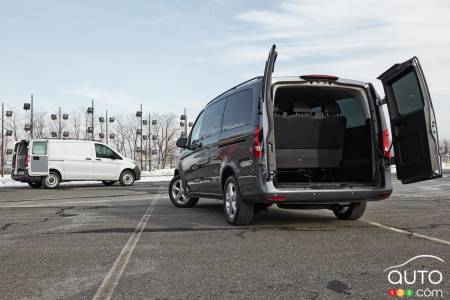Let’s be fair; when talking of commercial vehicles, Mercedes-Benz is probably not the first brand name that’s likely to pop into your head. Strange that though, considering the impact its famed diesel-powered Sprinter has had on the commercial segment of late.
MB was first to market the larger-than-most full-size van concept here in North America, and now we find both Ford (Transit) and Dodge (with its Fiat-based RAM ProMaster) attempting to play catch-up. The Sprinter might also be credited with changing the way industries view transportation today. The old one-size-fits-all concept is now dead in the water as businesses seek out products which better suit their particular needs; courier companies require decent fuel economy/size for long hauls, yet small & agile units for local downtown deliveries. An independent plumber could possibly make do with a station wagon, whereby a larger outfit may need the capabilities of a full-size Sprinter.
This led to a host of different sized products offered today: everything from humongous units (Sprinter/Transit/ProMaster) to the smaller compact (Transit Connect/ProMaster City) vehicles. But what if you need something in between those?
2016 MB Metris to the rescue!
The new Metris (Known as the Vito in all other markets) sits nicely in between the above-mentioned products. Think of it as a slightly oversize minivan (available with or without rear seats/windows), set on a commercial-grade, rear-wheel drive platform, and powered by a work-hungry, yet still fuel-efficient gasoline powerplant. It also looks good, and can be dressed up for pretty much any occasion; perfect for the plumber/electrician, yet equally suited as a taxi/limo/hotel shuttle or even as transportation for those with a large family.
The drive
The 2016 Metris comes powered by a 4-cylinder gasoline engine producing 208 horsepower & 258 lb-ft of torque, although I wouldn’t be surprised to see further power options arrive at a later date (possibly even a diesel version, but this could just be wishful thinking!). It is, however, a strong engine with ample power on tap. I also found it pleasantly quiet in operation, which is perfect if work requires you to spend the entire day behind the wheel.
Power is fed through a 7-speed (7G-TRONIC) transmission, which although I did manage to confuse once or twice (by hitting the gas pedal on & off rapidly in downtown traffic), is a smooth operating unit that makes the most use of the available power.
Ride quality is exceptional in many ways (almost car-like) and owners won’t be unhappy with fuel-economy figures; combined (estimated) = 10.5L/100kms Cargo model; 10.9L/100kms for the Passenger unit.
Another highlight that should please all is the 25,000km that can be driven between regularly scheduled maintenance. After all, who wants to have their vehicle in the shop when it’s supposed to be out there earning its keep, yes?
Not basic, but…
It’s tough to describe any Benz product as basic, and this is no exception to the rule. The vehicle oozes comfort in ride, and build quality shows in the touch and feel of everything. However, while the Metris compares favourably with other commercial products currently on sale in Canada, one can’t help feeling that the passenger model leans slightly more towards its workhorse colleagues than its passenger car cousins. However, there is a valid reason for this: In Europe (and other markets), there is currently a product called the V-Class (a luxury passenger van, which may one day find its way to North America). Until then, if leather upholstery is a must, I’m sure there’ll be plenty of aftermarket companies offering upgradeable interiors for the Metris (almost a certainty given the vehicles appeal as a limo/airport shuttle).
Pricing & specs
The 2016 MB Metris Cargo model starts at a pretty reasonable $33,900, with the passenger model (perhaps for the reasons given above) following this closely at just $37,900. I’d call both highly competitive for what’s on offer; unlike some competitors, the Metris comes standard with benefits such as Crosswind Assist, together with Attention Assist which helps prevent drowsiness at the wheel. There are also several additional option packages available, and all at quite reasonably priced.
The Cargo model offers 186 cu-ft of rear storage capacity, while the passenger version drops this to 38 cu-ft.
The 2016 MB Metris carries a tow rating of 4960lbs, which is quite impressive given the size of the vehicle.
Competitors
For the time being, the Metris sits quietly on its own, with the Ford Transit Connect/RAM ProMaster City/Nissan NV Compact/Chev City Express being slightly smaller, and the Chev Express/Nissan NV models being considerably larger.
I like the vehicle. It works well, and is competitively priced in my mind. That, plus the appeal of the 3-pointed Star on the front grille, should help drive sales. Of course, some might argue that driving a Mercedes-Benz product could appear a tad flashy/ostentatious to customers, leading them to perhaps expect higher prices. To that I say, “Absolute nonsense.”
Mercedes-Benz has built a strong reputation worldwide for quality and reliability, and isn’t that precisely what customers want and expect from their service providers? Remember that the next time your plumber/electrician turns up in a ratty old minivan with the rear seats removed!





